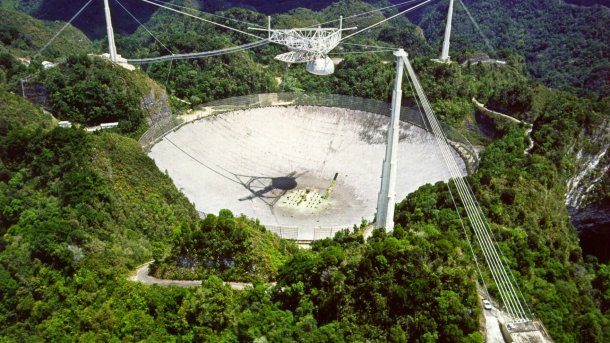Investigation report: This is why the Arecibo radio telescope collapsed
The Arecibo telescope collapsed due to corrosion on cable brackets. The problem was apparently overlooked during inspections.

The Arecibo telescope before it collapsed.
(Image: NAIC Arecibo Observatory, a facility of the NSF)
Four years after the collapse of the world-famous Arecibo telescope in Puerto Rico, the exact cause has now been determined. According to the investigation report, zinc corrosion in cable mounts caused the large observation platform to collapse into the huge antenna dish on December 1, 2020, destroying it in the process. Two years after the collapse, it was decided not to rebuild the telescope and to set up an education center there instead.
The University of Central Florida and the National Science Foundation (NSF) commissioned an investigation after the accident. According to the official investigation report, Hurricane Maria, which hit the observatory in 2017, also played a role in what happened. The extreme wind speeds of 170 to 190 km/h had led to the highest structural load since the telescope opened in 1963.
The wrong repairs planned
Inspections were carried out after the storm, during which no serious damage was initially detected. However, the telescope was later taken out of operation after problems were discovered. However, the wrong components were apparently scheduled for repairs. However, this work was delayed for years anyway, so that it would probably have been carried out too late to preserve the telescope.
Videos by heise
The immediate cause of the collapse was the failure of an auxiliary cable and a main cable. The collapse then occurred when further support cables gave way. Fortunately, no one was injured in the incident.
The world's largest radio telescope for many years
From 1963 to 2016, Arecibo was the largest radio telescope in the world, with a diameter of 305 meters. Among other things, it discovered a binary pulsar and the first exoplanets in 1974. It also became famous for sending a message from humanity into space.
(mki)